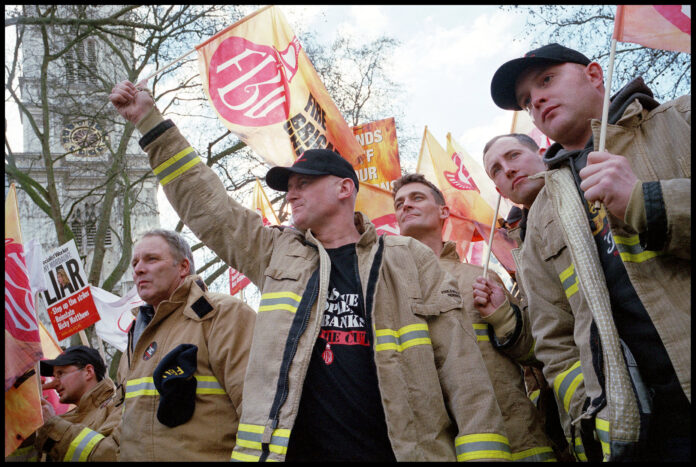Editorial of the Socialist, issue 1171
The Socialist has printed in full (below) the statement issued on 8 March by the executive council of the Fire Brigades Union (FBU) on Russia’s invasion of Ukraine.
We applaud the FBU’s clear denunciation of the war and its defence of working-class unity across national boundaries.
“We have no trust or confidence in the Johnson government”, the union correctly says, as it also declares support for “workers in Ukraine acting independently of the Zelensky regime and building their own organisations” and “solidarity with those in Russia who have protested against the invasion”.
There are issues posed in the statement which could be discussed. Sanctions imposed by hypocritical capitalist politicians on their former oligarch friends are one thing, for example. But workers’ action to boycott the Putin regime could potentially appeal to Russian workers and raise their confidence to organise. Unite General Secretary Sharon Graham was right to back members in Orkney acting against a Russian oil tanker.
Nevertheless, the FBU’s bold call for workers’ unity against war deserves the widest possible circulation.
But the unanswered question in the FBU’s statement is: what political vehicle is there for workers’ organisations in Britain to spread such a call far and wide? To even raise the call in parliament?
The FBU correctly condemns Sir Keir Starmer’s shutting down of debate on the war within the Labour Party, with the threat to withdraw the parliamentary whip from dissident MPs -as he has done, for 16 months now, to Jeremy Corbyn.
Workers can clearly have ‘no trust or confidence’ that their interests will be represented by Starmer as much as by Johnson.
The FBU voted to disaffiliate from the Labour Party in 2004 as Tony Blair’s New Labour government used the cover of the Iraq war to attack firefighters’ pay, conditions and working practices.
It reaffiliated in 2015 after Jeremy Corbyn’s leadership election victory offered the possibility that Labour could be reclaimed as a party for the working class.
But that opportunity has definitively passed. As the capitalists look to offload the economic costs of the Covid crisis, and now war, onto the working and middle classes, a new mass workers’ party is ever more necessary.
The next step the FBU should consider would be to link up with other left unions like Unite, the RMT – which has also called for “cross-border solidarity between workers” against war – and the recently disaffiliated BFAWU bakers’ union to organise a conference on what needs to be done to turn anti-war and pro-working class declarations into the bold political action that this crisis requires.
FBU executive council statement on the war in Ukraine
1. We oppose and condemn the Russian invasion of Ukraine. We call for an immediate ceasefire and for all Russian armed forces to immediately withdraw from Ukraine.
2. The war in Ukraine is an extremely dangerous development. Implicit in the situation is the risk that it may spread and escalate, drawing other countries into a growing international conflict. The working class has nothing to gain from war and will pay the biggest price, both in Russia and Ukraine.
3. Despite the terrible situation, we support the building of unity among workers across national boundaries. The workers of Ukraine and Russia have common interests.
4. We stand in solidarity with those in Russia who have protested against the invasion, despite police repression. We support the building of a mass anti-war movement, including among Russian troops.
5. We support workers in Ukraine acting independently of the Zelensky regime and building their own organisations and taking independent action. This should include attempts to build dialogue and links with rank-and-file troops in the invading Russian forces.
6. We condemn any far-right or fascist group, on either side of this conflict, seeking to take advantage of the war to build their own organisation and activity by further provoking national and ethnic tensions
7. We send our solidarity to Ukrainian firefighters and other emergency service workers, delivering humanitarian service in the most appalling conditions. We will seek to build support and send practical solidarity where possible, including through the relevant trade union where appropriate.
8. This war is also a proxy conflict between Russia and Nato prompted by Nato expansion into central and Eastern Europe. We oppose this expansion and any intervention in this conflict by Nato forces.
9. We note that economic sanctions will disproportionately hit working people, and will be seen as an aggressive measure by the west, and may well strengthen support for Putin.
10. We have no trust or confidence in the Johnson government on this or any other matter. They have demonstrated for more than two years their utter disregard for human life through the deliberate mishandling of the pandemic, leading to the loss of more than 150,000 lives in the UK.
11. We note the hypocrisy of those in the UK government criticising the state repression of protest in Russia, whilst the police, crime and sentencing bill will serve to create authoritarian restrictions on protest and democracy in the UK.
12. We oppose the UK government’s disgraceful restriction on the right of refugees fleeing the war to enter the UK. We call for refugees from this and other conflicts to be welcomed.
13. In wartime, as in peace time, we defend the democratic right to speak out, discuss, debate and protest. We condemn the attempts by the leader of the Labour Party to shut down such discussion within the Labour Party and to bully and threaten those with different views.
14. Workers in Ukraine and Russia – and across the world – have common interests. Even in this appalling situation, we stand for workers’ unity and internationalism.








